After India, will Singapore be the next country to decriminalise gay sex?
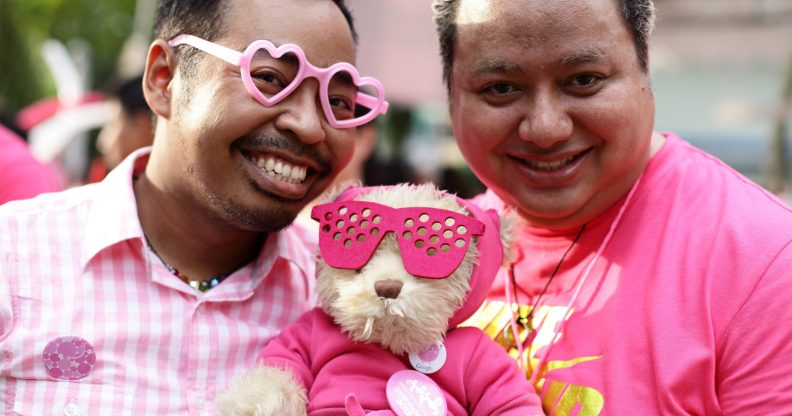
Singapore has banned gay sex since before it was independent (Suhaimi Abdullah/Getty)
A veteran diplomat has urged Singapore’s LGBT+ community to challenge a law prohibiting gay sex after India’s Supreme Court struck down the country’s ban on Thursday.
Tommy Koh, the country’s former UN ambassador, called for a class action suit to change Singapore’s Section 377A law, which, like India’s now-defunct legislation, was put in place under British colonial rule.
Singapore’s Law and Home Affairs Minister Kasiviswanathan Shanmugam has also raised the possibility of repealing the law, which carries a sentence of up to two years in prison and predates Singapore’s independence in 1965 by a decade.
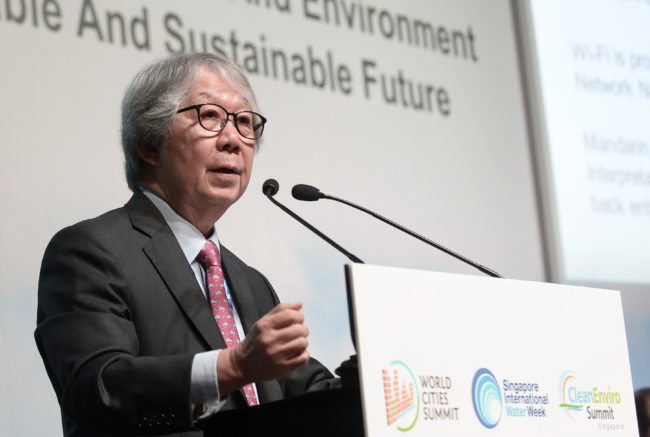
Tommy Koh is currently serving as Singapore’s Ambassador-at-large (ROSLAN RAHMAN/AFP/Getty)
In response to a Facebook post by the dean of National University of Singapore’s Faculty of Law, Simon Chesterman, about the Indian court’s decision—which sparked joyous celebrations across the country—Koh wrote: “I would encourage our gay community to bring a class action to challenge the constitutionality of Section 377A.”
Another user replied: “Prof, hasn’t that angle been disposed of by Lim Meng Suang?” in reference to the unsuccessful 2014 attempt to overturn the anti-gay law.
Koh responded with a simple solution, writing: “try again.”
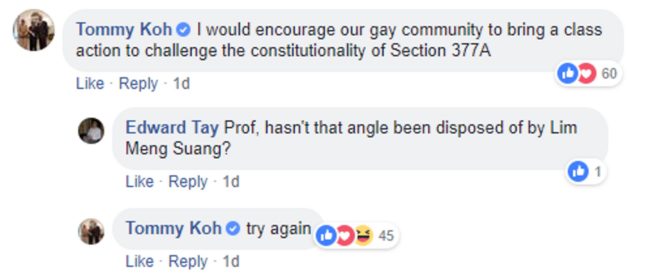
“Try again” (Simon Chesterman/facebook)
Shanmugam, a cabinet minister, sounded sympathetic when asked about the issue on Friday.
He said, “Singapore… on this issue, it is a deeply split society. The majority oppose to any change to section 377A—they are opposed to removing it,” according to Channel NewsAsia.
“A minority—I have to say, a growing minority—want it to be repealed. The government is in the middle,” continued Shanmugam.
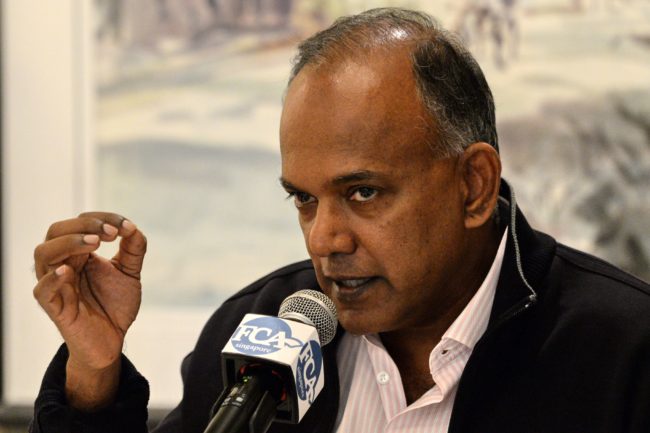
Singapore’s Home Affairs and Law Minister Shanmugam (ROSLAN RAHMAN/AFP/Getty)
“This issue relates to social mores, values—so can you impose viewpoints on a majority when it so closely relates to a social value system?”
But Shanmugam emphasised that the country’s founding Prime Minister Lee Kuan Yew had been “sympathetic” towards LGBT+ people and had “expressed his understanding for those who are gay.”
Shanmugam pointed out that prosecutions for gay sex are rare, and that thousands attend the Pink Dot Pride event every year in the sovereign city-state of 5.6 million people.
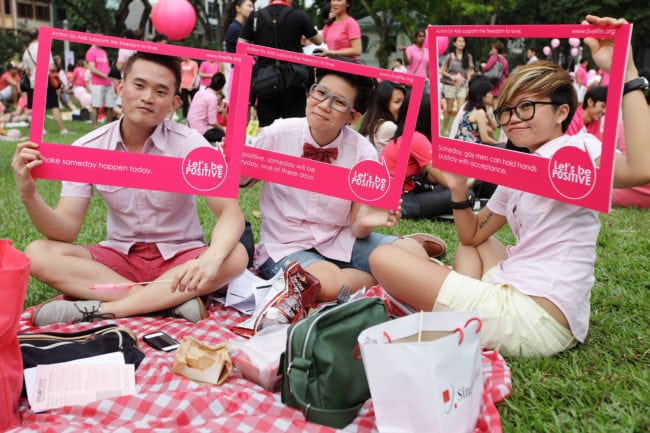
Those convicted of having gay sex face up to two years in prison (Suhaimi Abdullah/Getty)
“The law is there but generally there have been no prosecutions for private conduct,” said Shanmugam.
“People openly express themselves as gay, you [have] got the gay parade. Police even approved a licensing for it, no-one gets prosecuted for declaring themselves as gay.
“So, really, when was the last time someone was prosecuted?”
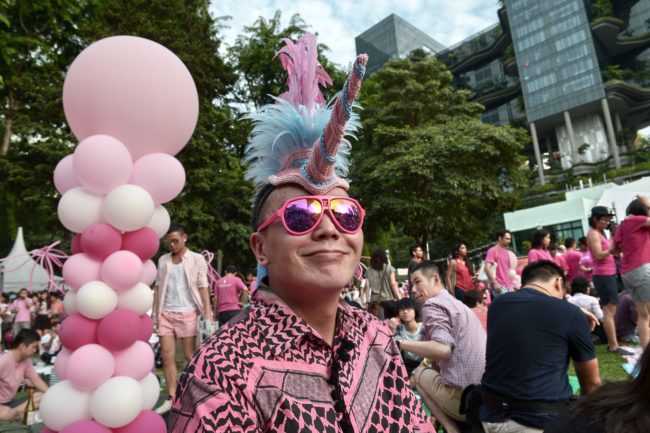
The Pink Dot Pride event attracts thousands every year (ROSLAN RAHMAN/AFP/Getty)
Shanmugam hinted at his personal acceptance of gay people, saying: “Speaking for myself, if you ask me, in a personal capacity, personal view—people’s lifestyles, sexual attitudes—(we) really should be careful about treating them as criminals or criminalising that.”
He refused to explicitly voice his support for LGBT+ equality, though, saying: “But again, it will be wrong for me to impose my personal views on society or as a policymaker.
“We live our lives, live and let live. If one side pushes, you will expect a substantial pushback.”
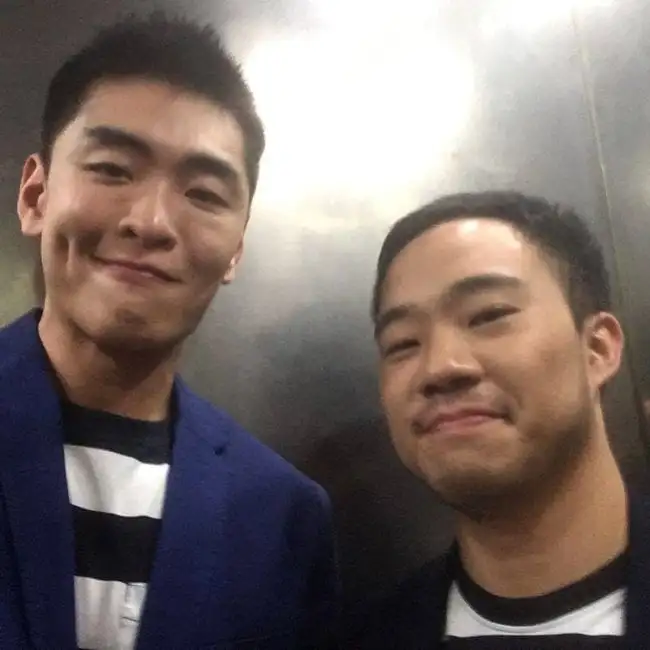
The prime minister’s nephew, Li Huanwu, came out publicly last month (Li Huanwu/facebook)
PinkNews spoke to activist Rachel Yeo last month about how life for LGBT+ people in Singapore can be difficult, with mental health issues prominent and a ban in place on positive representations of queer people in mainstream media.
Li Huanwu, the grandson of Singapore’s first prime minister and nephew of its current prime minister, came out as gay in July, but his public statement was seen as brave and unusual, rather than commonplace.

